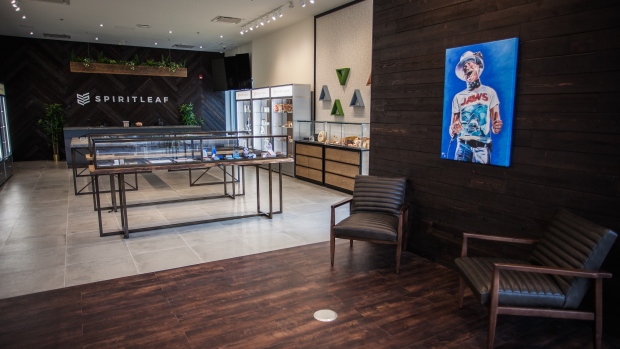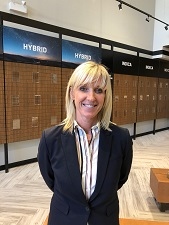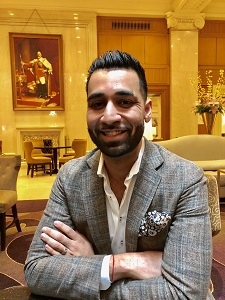Mar 29, 2019
‘Without precedent’: Inside the scramble to open Ontario pot shops on time

The launch of licensed recreational cannabis stores in Ontario has become a highly anticipated milestone in the still-nascent days of legal marijuana in Canada. Despite plans changing several times, these stores are expected to play a major role in boosting sales of legal pot in Canada’s biggest market.
BNN Bloomberg talked to some of the key players who’ve been toiling away for months getting these retail outlets ready for prime time. Here are some of their stories:
THE LICENCE WINNERS
Amid a flurry of construction workers nailing down fixtures and sales staff researching cannabis products, Ontario pot store licence winner Heather Conlon says after a busy six weeks, there's finally light at the end of the tunnel.
"There's not enough hours in a day," she sighed, as she inspects her Nova Cannabis store's vault where its cannabis inventory will be secured during off-hours.
Just a few blocks down Toronto’s trendy Queen Street, the sound of table saws ring outside The Hunny Pot, as staff prepares the final touches for the store’s launch on Monday.
"I can't say it's a passion because I never thought of it that way before," said Hunny Gawri, the owner of The Hunny Pot store who also works as a Mississauga-based realtor. "But this has been a challenge that's been very, very appealing to me."

For these cannabis store licence winners, owning one of the first pot shops in Ontario is an incredible feat of luck. All the licence winners that BNN Bloomberg spoke to were understandably pleased with their good fortune and looked forward to being a small part of Canadian cannabis history.
Some opted to work with a retail partner to open their stores, while others rallied a team of staff to help them without any external help.
"I got my legal counsel right away and with their advice, I didn't entertain anything," Gawri said. "It was all about how to open this on April 1."
The stores are also fueling some employment gains throughout the province with between 30 to 50 people hired per retailer, the licence winners said. To date, more than 600 CannSell certificates have been issued by Lift & Co., the "Smart Serve"-like training programs mandated by the province to be able to work as a cannabis retail staffer.
Meanwhile, some licence winners are flying under the radar. Indeed, there are several Ontario pot store licence applications whose retail outlet has no digital presence or contact information.
For example, RELM Cannabis Co., a store owned by David Nguyen doesn't have a website or social media accounts -- and only recently posted a job ad on Kijiji on Monday seeking sales staff.
For Conlon, one of her last decisions is to settle on the artwork that should appear on her store's walls. In the end, she decided to go with some graffiti, a nod to the store's location around Toronto's famous Graffiti Alley.
"It's just going to add a little bit of culture and colour," she said with a chuckle.

THE RETAILERS
While April 1 will be the first day of business for some cannabis retailers, others will be waiting on the outside looking in.
The Alcohol and Gaming Commission of Ontario issued 10 out of the 25 licences it awarded during a lottery process, all but ensuring less than half of the province's planned storefronts will open their doors on Monday.
Despite spending the last few days putting the final touches on its Nova Cannabis store in Toronto's Queen Street West neighbourhood, the retailer is "still waiting for that piece of paper from the government," said James Burns, chief executive officer at Alcanna Inc., which partnered with licence winner Heather Conlon to help build the cannabis outlet.
"We came to an agreement that made sense to [Conlon] and made sense to us to get our brand in the market temporarily," Burns said. "It's useful to have a small footprint in this market until it opens up for business in a year or whenever."
Burns actually doesn't mind the delay, noting that at least Ontario's cannabis retail rules are relatively easier to follow than in Alberta where municipalities have different variations to a wide swath of zoning restrictions.
"Some rules [in some cities] change and then it just didn't make sense to be there," he said. "Ontario was pretty clear by comparison."
For Nick Kuzyk, chief strategy officer at High Tide Inc., which partnered with three Ontario licence winners, Monday represents the end of a frenzied two months rushing to get its stores up and running.
Like Nova Cannabis, High Tide's Canna Cabana outlets will remain shut as the AGCO hasn't issued licenses for any of those stores. That isn't fazing Kuzyk.
"The AGCO has a vested interest in making this a successful endeavour," he said. "We’re all motivated in getting through this process, having great stores, and putting a dent in the black market."
- Canopy's Linton says Ontario's pot shop launch will 'be like Oct. 17'
- Pot sales edge up in sputtering start for Canada’s legal market
- Ontario pot store lottery winner reaches licensing deal with Nova Cannabis
RELATED
He credits the AGCO for working overtime to ensure all stores are licensed in time, half-joking the agency's staff deserve a long vacation in May. Much of the AGCO’s work included financial and police background checks on lottery winners, although many of the details about the licensing process remain confidential.
Kuzyk hopes to be able to open at least two of the Canna Cabana stores in time for April 20, the unofficial marijuana holiday which should provide retailers with a temporary boost in sales.
"A week or two in the grand scheme of things is not a big deal," he said. "We’d like to be part of the opening but it’s more important to open a store with well-trained staff than it is to rush something and be a potential disaster on day one."
Alcanna and High Tide are keeping a close eye on future Ontario licensing plans after December, when the province is expected to decide whether to open the province up to all players or continue with another lottery system. Both retailers maintain a list of potential or conditional leases they could sign depending on the outcome.
"It could take years or it could change in September; it's impossible to tell," Burns said. "But real estate isn't hard to get, especially if you haven't missed a rent payment in 25 years."
THE DESIGNER
After spending his career crafting the look and design of some of the world's most luxurious retailers like Louis Vuitton and Nordstrom, John Simmen never thought he'd be designing a pot store.
"If you asked me a couple of years ago, I never would have believed it, but it's the reality today," Simmen, co-principal of Seven Point Interiors, told BNN Bloomberg.
But today, Simmen and his business partner Robert Fisk have their fingerprints on at least three Ontario cannabis chains including Spiritleaf, Canna Cabana and The Hunny Pot - and likely more to come.
"We realized there was a lot of inexperience in building retail stores, so when we started Seven Point, we really geared toward creating a turnkey solution," Simmen said. "The client would come to us and we'd come up with a design and we'd hire an architect to do the whole installation, so a client would have very little to do on their own."
Each store offers a different design aesthetic which takes about six to eight weeks to complete, Simmen said. For Spiritleaf, it was embracing an Indigenous motif, while Canna Cabana is more eclectic and tropical, he said, noting The Hunny Pot, naturally, incorporates a lighter look inspired by bees and honey.
"We usually start with a colour palette and some inspirations and kind of take it from there," Simmen said. "We ask our clients to look at Pinterest and then get back to us."
The biggest difference between cannabis stores and retailers in the fashion or cosmetic industries is in branding, Simmen said, due to marketing restrictions in The Cannabis Act.
"With the vanilla packaging, it's a little bit more low key and challenging," he said.
And with Canada's restrictions on how cannabis can be displayed in stores - in short, it must be in a "sensory display jar" that allows patrons to smell and look at the product, but not touch it - Seven Point's Simmen and Tusk had to focus on the broad look and feel of the interior of a pot store.
"For Spiritleaf, they wanted their clientele to feel right at home when they entered their stores," Tusk said. "They didn't want a clinical kind of environment."
Simmen said he recently spent four days prepping the inside of The Hunny Pot to make sure it can open on April 1.
"I've been sweating my ass off working there until 1 a.m. in the morning," Simmen said. "Darn tootin' it'll be ready for April 1."
THE SUPPLIER
It may be just a handful of stores, but the launch of bricks-and-mortar cannabis shops should help to double pot sales in Ontario, according to one leading marijuana industry executive.
Supreme Cannabis Company Inc. president John Fowler expects per capita spending in the province to at least double now that consumers will have physical access to legal pot, compared to buying online sight unseen for the past six months.
"In a market like Ontario, which is Canada's biggest market, these bricks-and-mortar stores are going to be critical to ensuring the success of legalization," Fowler told BNN Bloomberg.
Ontario's retail sales in the first several months have been mostly flat, according to Statistics Canada. In January, Ontario residents bought $8.9 million worth of cannabis, compared to $8.7 million in December. Over the first four months of legalization, Ontarians spent $38 million on legal cannabis, nearly 20 per cent of the country's total spend.

Fowler said these new stores will likely put a dent in the black market, but legal prices and the quality of the product will have to improve meaningfully to compete with illicit supply.
Fowler said Supreme Cannabis isn't planning to operate differently now that there's a new retail channel open in Ontario but intends on reaching out to the upcoming stores to educate the shops' "budtenders" on their various strains.
"The rubber hits the road when those stores open," he said.
But Fowler also puts the opening of these stores into a unique perspective, noting that "there's something really special about living in a country where whether we have enough cannabis retail stores is top line news."
"I open up my Twitter and see public officials complain that there's not enough pot stores in their ridings and I think that's fantastic to see as an entrepreneur," he said. )
THE LAWYER
There may be no person more relieved to see Ontario's pot stores open on Monday than Chad Finkelstein.
The partner at Toronto-based law firm Dale & Lessmann LLP spent months working with many clients, either on the retailing side or licensing side, often pulling all-nighters crafting paperwork and agreements needed to help put deals together.
"There was nothing that was normal or conventional or even with precedent about this process," he said.
Finkelstein's firm - which often focuses on franchise law - has been working on the Ontario cannabis retail sector for about a year, ever since Kathleen Wynne's Liberal government announced the province's first pot shops would be owned by Queen's Park, much like the LCBO. But after Doug Ford's Progressive Conservatives won a mandate in June 2018, those plans were turfed.

Initially, the Ford administration proposed a free-for-all landscape until they opted to move to a lottery system in December to award licences in light of a nationwide cannabis supply shortage that hampered retail in other provinces.
"Everything was upended," Finkelstein recalls. "At one point, everybody wanted to be first to market and then that all changed in a hurry."
Once the lottery system was complete and the 25 winners were randomly selected, Finkelstein found himself in the middle of negotiations with several companies across the country attempting to be one of the first bricks-and-mortar cannabis stores in Canada's biggest market - albeit with a premium.
"It was without precedent to be doing so much work with so much money involved with so little regulatory certainty," he said.
Finkelstein noted that "a lot of money" was spent on signing leases for potential cannabis stores in Ontario prior to the province capping the number of retail outlets at 25. He recounted how some clients battled for prime real estate and conditionally signed as many as 75 leases, the then-maximum number of shops a company could open under the prior provincial guidelines.
"We had to do some really long-term thinking in basically a regulatory void," he said.
All that prepping came in handy once the 25 lottery winners were announced, making it easier to help stores prepare for their debut on April 1.
"We're talking about the sale of the most highly regulated product in the country and now it's being put into the hands of 25 random people who had limited-to-no retail experience at all," Finkelstein said.




